

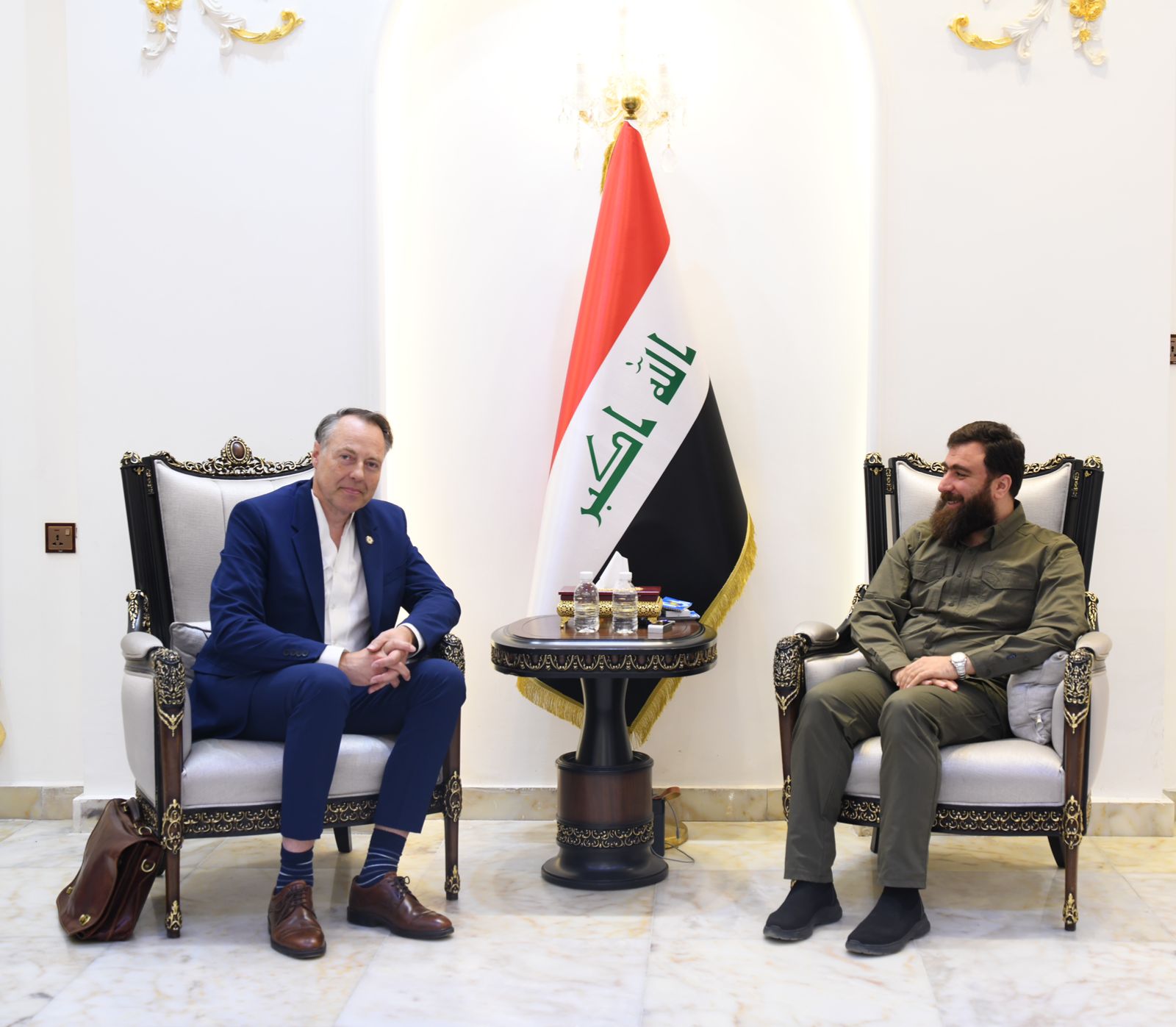
Working quietly over the past two years, a diverse collection of officials and private organizations came together to secure the release of Elizabeth Tsurkov, the Israeli-Russian academic who was kidnapped by the Shiite militia Kataeb Hezbollah in Iraq in 2023 and released earlier this month.
Senior US officials, Iraqi ministers, and an Israeli-born executive played key roles in getting Tsurkov out of captivity.
But help also came from a rather unlikely and far-off place — Iceland.
Birgir Thorarinsson, a former Icelandic parliamentarian and chair of the political affairs and security committee in the Organization for Security and Co-operation in Europe, flew to Iraq and Iran to help free the Princeton doctoral student, even playing a key role in getting the Iran-backed militia to give up on the massive ransom it was demanding — a development he calls “the breakthrough.”
His story, which he shared exclusively with The Times of Israel, is one piece of the multinational effort to secure Tsurkov’s release, much of which has yet to be told.
Elizabeth Tsurkov went missing in late March 2023 while doing research for her PhD dissertation on Shiite movements in Iraq. She likely used her Russian passport to enter the country, as Israel and Iraq do not have diplomatic relations.
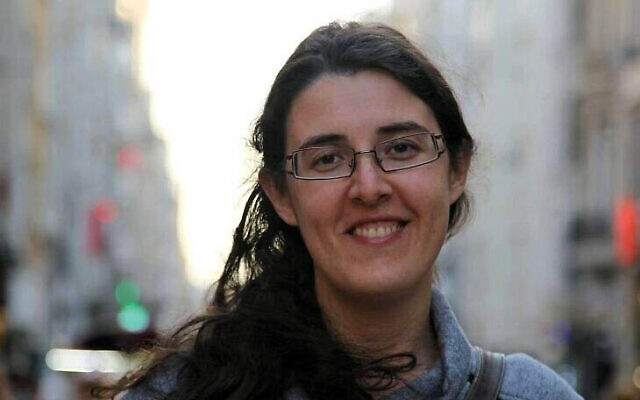
Tsurkov was visiting Iraq for research work on Iran-backed factions in the country, particularly the movement of Iraqi Shiite leader Moqtada Sadr. She previously conducted fieldwork in Syria, Iraq, Jordan, Turkey and other countries in the region, according to her website. She had also visited Iraq in the past.
She was held for two and a half years by Kataeb Hezbollah, which is supported and funded by Iran. The terror group claimed she was spying for Israel, a charge that Israel and her family denied.
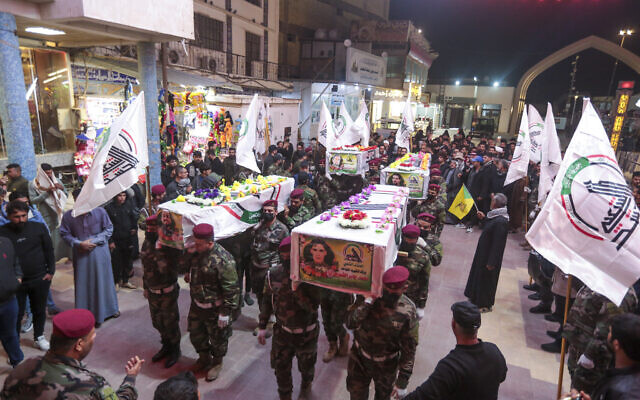
Thorarinsson encountered Elizabeth’s sister Emma in April 2023 at a press conference in Washington, DC, in which she heckled Iraqi Prime Minister Mohammed Shia’ al-Sudani for not doing enough to secure her sister’s release.
“She’s held hostage in your country,� Emma Tsurkov shouted at Sudani during the Atlantic Council event in the US capital.
“You are not doing anything to save her. And you can’t, because they are your government’s partners,” Tsurkov said of Kataeb Hezbollah. “They are Iraqi government employees, and you should be ashamed of yourself that you’re not doing anything to help her and save her.â€�
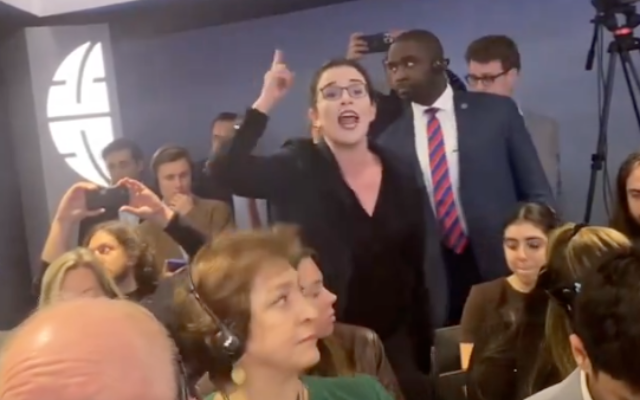
“She’s innocent and you know it.�
Thorarinsson turned to Orli Naschitz, honorary consul of Iceland in Tel Aviv, to establish contact with Emma.
The US was much more interested in this case than the Israelis
According to the Icelander, Israel failed to put its full might behind the effort. “The US was much more interested in this case than the Israelis,” he lamented.
Thorarinsson told The Times of Israel that he offered Emma his help during a video call, noting he had government contacts in Iran from his previous work with the Council of Europe on Afghan refugees in Iran. Emma accepted, and they put together a call with Mickey Bergman, executive director of Global Reach, a private American organization that assists in the return of hostages and political prisoners.
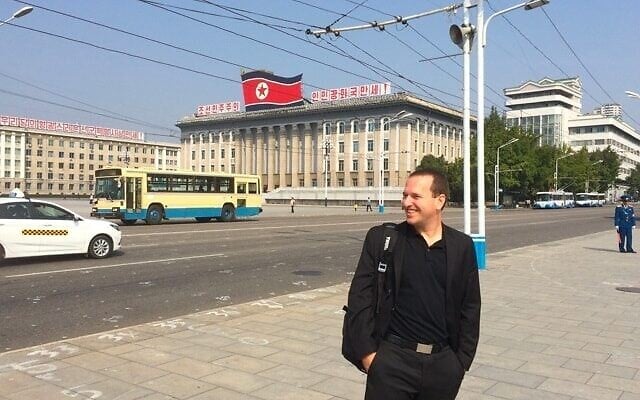
Bergman confirmed to The Times of Israel that he had been in touch with Thorarinsson about planning a trip to Iran.
Emma Tsurkov did not respond to requests for comment.
In July 2024, Thorarinsson met with Iranian Ambassador Alireza Yousefi at the Iranian Embassy in Oslo, Norway, who arranged contacts in Tehran and invited the Icelander to the presidential inauguration ceremony for Masoud Pezeshkian at the Iranian parliament on July 30.
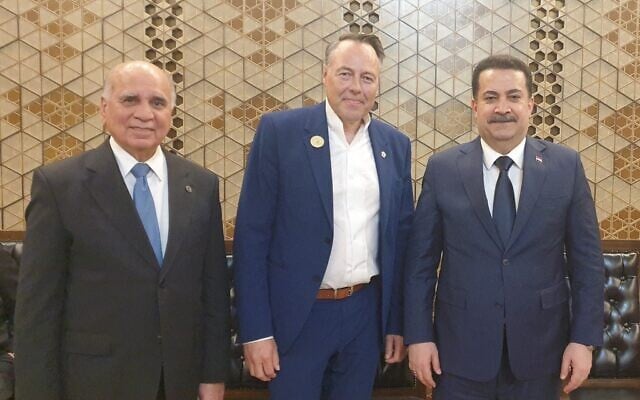
Two days before the ceremony, Thorarinsson met in Tehran with Ebrahim Azizi, vice chairman of the National Security and Foreign Policy Commission, and Ambassador Majid Nili Ahmadabadi, deputy minister and director for European Affairs.
According to Thorarinsson, Ahmadabadi offered to arrange a follow-up meeting with Iran’s envoy to Iraq in Baghdad.
Thorarinsson also met briefly in Tehran with Sudani and Iraqi Foreign Minister Fuad Husseini to discuss the case, and arranged to discuss it in-depth in Baghdad.
“During these initial engagements,” said Thorarinsson, “I was informed that Elizabeth was still alive.”
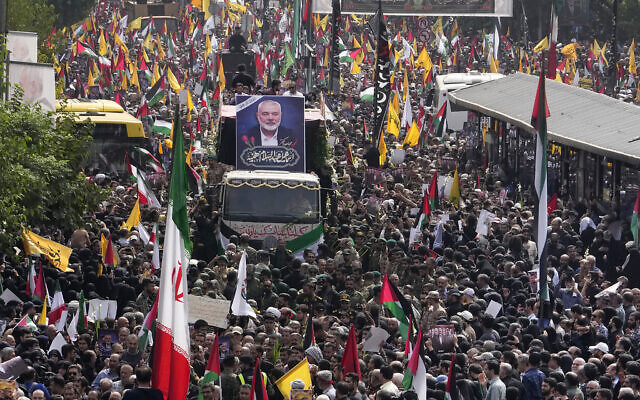
As he was leaving Tehran the day after the ceremony, an explosion rocked the Islamic Revolutionary Guard Corps’ guesthouse in Tehran.
Israel had assassinated Hamas leader Ismail Haniyeh.
As a result of the strike, according to Thorarinsson, the Baghdad meeting never took place.
But he kept pushing ahead. Thorarinsson organized a parliamentary delegation to Iraq for the next month with MPs from Spain, Cyprus, and the UK to raise Elizabeth’s case with Iraqi officials.
War got in the way of that effort as well. Israel dramatically escalated its fight against Hezbollah in September 2024, detonating thousands of pagers and walkie-talkies, invading southern Lebanon, and killing Hezbollah leader Hassan Nasrallah.
Israel had been engaged in open conflict with Hezbollah since it joined the fighting, a day after October 7, 2023, Hamas massacre in southern Israel.

The parliamentary mission to Iraq was canceled.
Thorarinsson and Emma met again in November in Las Vegas, and the two remained in touch over the subsequent months.
Thorarinsson’s breakthrough came in April 2025, at a prayer breakfast in Erbil, Iraqi Kurdistan. At the event, he met Khassan Saka, an Iraqi-Canadian activist with deep political connections in Iraq.
Saka took him to meet an adviser to Ammar al-Hakim, a prominent Shiite Iraqi cleric and politician who led the Islamic Supreme Council of Iraq political party.
They arranged a meeting in Baghdad for May, which lasted 70 minutes. According to Thorarinsson, he brought up Kataeb Hezbollah’s $200 million ransom demand to Hakim, who considered it unreasonable.
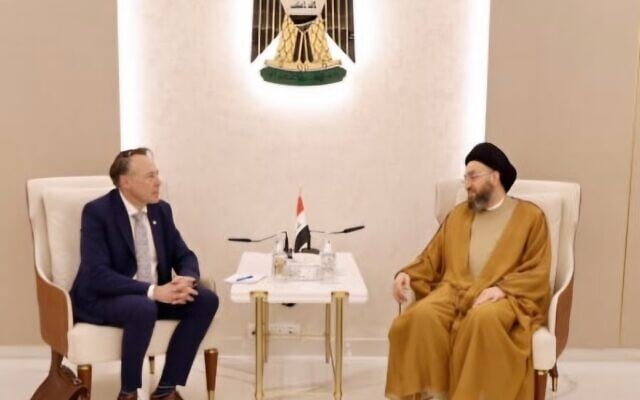
“He assured us of his commitment to resolving the case,” said Thorarinsson, “and stated he would raise the matter with Prime Minister Mohammed Shia’ al-Sudani that same evening.”
“The case is a matter of national security for Iraq,” said Hakim, according to Thorarinsson’s meeting notes, which were viewed by The Times of Israel. “The Iraqis are concerned that it will have a negative effect on the rebuilding of the state of Iraq that Elizabeth has been detained in Iraq for so long time. It effects [sic] the Iraqi economy and sends a negative message to those visitors who want to come to Iraq.”
Hakim also said that the events of October 7, 2023, made it much harder to free Tsurkov, and it “would have been solved quickly” were it not for the Hamas attack and the subsequent fighting in Lebanon.
The cleric told Thorarinsson that that US “responded positively” to Kataeb Hezbollah’s demand for a prisoner exchange involving Lebanese and Palestinian prisoners, but rejected the idea of paying a ransom.
The meeting was “instrumental to the eventual resolution,” said Thorarinsson.
Hakim also told Thorarinsson that US negotiators had made a mistake by threatening “to burn Iraq down” if Tsurkov was not freed within 48 hours.
“This was a grave mistake by the US delegation,” said Thorarinsson.
“It was obvious that Mr. Al-Hakim was deeply upset. I believe this contributed to many months’ delay in her release.”
He also met in Baghdad with Rayan al-Kildani, the Assyrian Christian leader of the Babylon Movement party and its controversial militia, the Babylon Brigade.
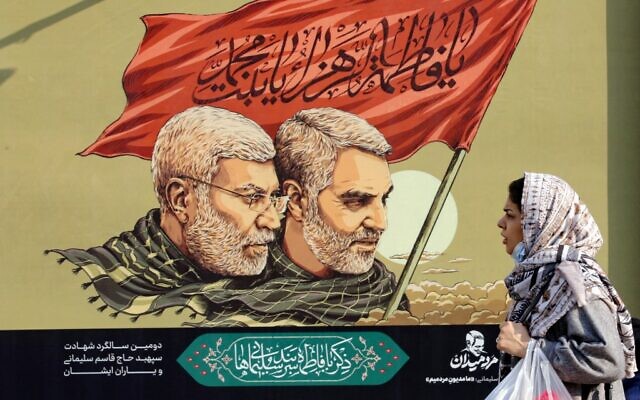
Kildani, sanctioned by the US for human rights abuses, is an ally of Kataeb Hezbollah leader Abu Mahdi Al-Muhandis, who was assassinated by the US in 2020 alongside Iranian Revolutionary Guard Corps commander Qassem Soleimani. Still, he offered Thorarinsson advice, noted that Iran had influence over the issue, and told the Icelander that kidnapping a woman was “disrespectful; this was not done in the old days.”
Kildani told him that “the US is more interested in this case than the Israelis. We need serious actors to solve this,” according to Thorarinsson.
The militia leader also lamented that Washington was dragging its heels, and that the UAE should be contacted to set up a third-party negotiating team.
On May 5, Thorarinsson was informed by Hakim’s adviser that the Shiite cleric had convinced Kataeb Hezbollah to waive its massive ransom demand entirely.
“That meeting was a huge success,” said Thorarinsson.
“This was an unexpected but crucial development,” he noted. “Without the waiver, I believe that the release would not have been possible, as both the US and Israel have categorically refused to pay it. So that was the breakthrough.”
The result of Kataeb Hezbollah’s demand for a prisoner exchange remains unclear. Lebanese and Saudi media reported that Iraqi militia members were released, and that talks would be held on the release of Hezbollah operative Imad Amhaz, whom Israeli commandoes captured in a raid in Lebanon in November 2024, and five other detainees.
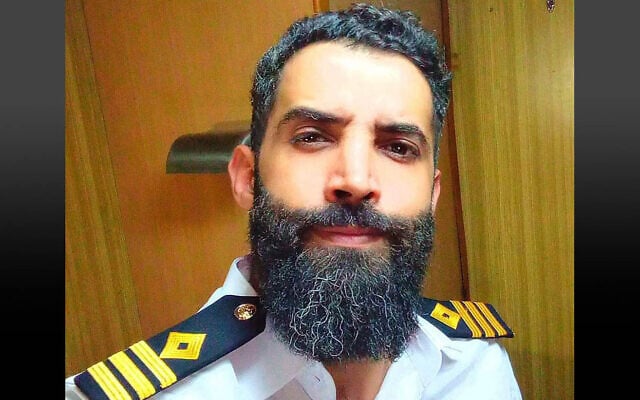
Thorarinsson’s last involvement was on August 28, when Emma called to consult with him about a potential prisoner exchange that would free Elizabeth, which he relayed to Hakim.
On September 9, after 903 days in captivity, Elizabeth Tsurkov was freed
without ransom.
Sources told the Saudi newspaper Asharq Al-Awsat that her release came after the Iraqi government began putting pressure on Kataeb Hezbollah, along with US warnings of the consequences of keeping her hostage. Her captors received nothing in return for her release, sources told the newspaper.
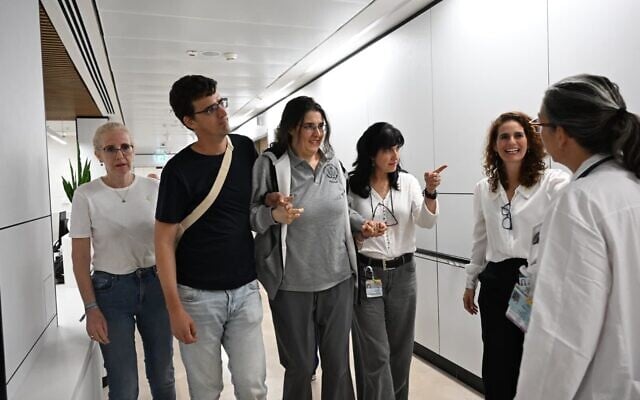
According to sources, Tsurkov was brought to a location in Baghdad and left alone there for some four hours until Iraqi officials, who were told where she was, came to pick her up. She was then taken to the US embassy in Baghdad. From there, she was flown to Greece and then on to Israel, where she is beginning a long and complex rehabilitation process.
Thorarinsson believes his nationality allowed him to play an effective role: “I believe in my position and my personality of an Icelander from a country that has no enemies played very significant role enabling actions and dialogue. So this neutral background that I have allowed me to operate without suspicion or political target.”

